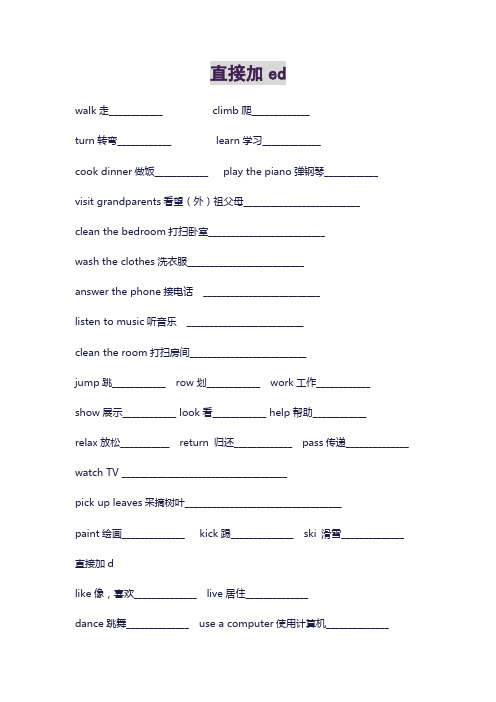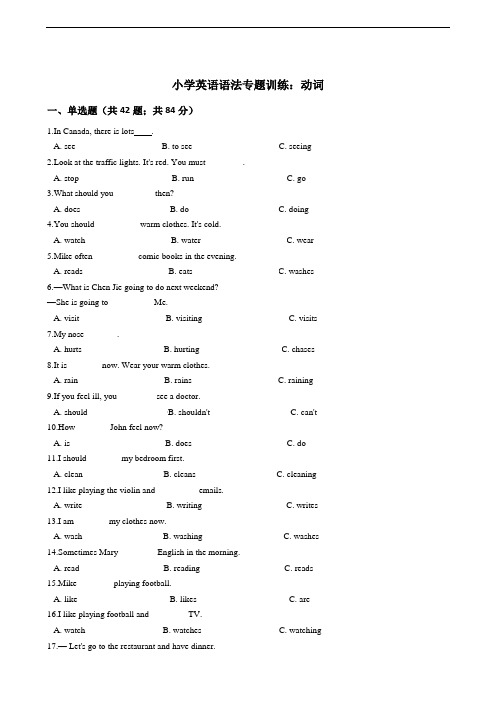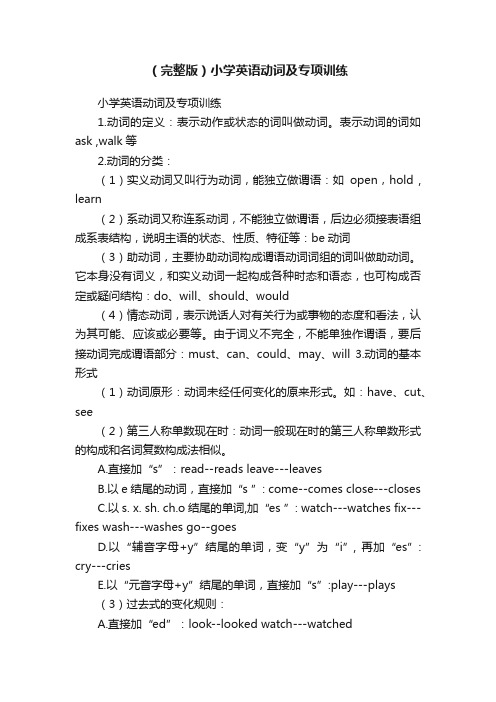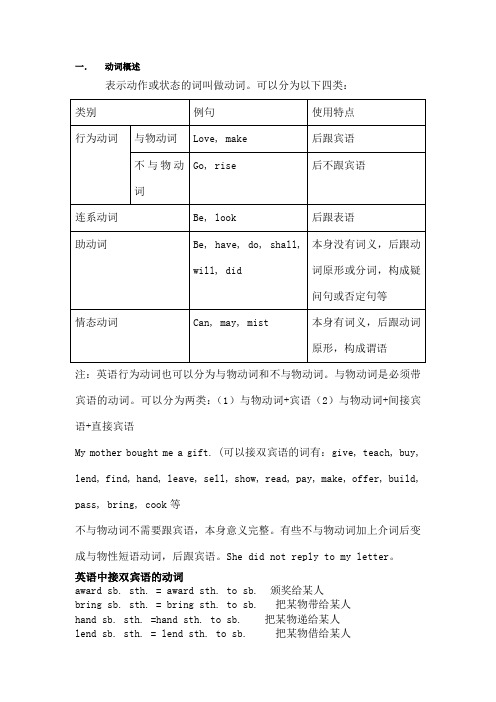小学英语动词知识点及练习题.pdf
(完整版)小学英语动词过去式变化总结及练习题

直接加edwalk走____________ climb爬_____________turn转弯____________ learn学习_____________cook dinner做饭____________ play the piano弹钢琴____________visit grandparents看望(外)祖父母__________________________clean the bedroom打扫卧室__________________________wash the clothes洗衣服__________________________answer the phone接电话__________________________listen to music听音乐__________________________clean the room打扫房间__________________________jump跳____________ row划____________ work工作____________show展示____________ look看____________ help帮助____________relax放松___________ return 归还_____________ pass传递______________ watch TV _____________________________________pick up leaves采摘树叶___________________________________paint绘画______________ kick踢______________ ski 滑雪______________ 直接加dlike像,喜欢______________ live居住______________dance跳舞______________ use a computer使用计算机______________love爱______________ taste尝______________close关上______________ prepare准备_____________不规则变化eat吃____________ have有;吃____________ buy买____________ take买;带____________ go去____________ sing唱歌____________ teach(taught)教run(ran)跑fight(fought)打架get up起床____________ swim游泳____________ fly飞____________ swing(swung)荡sleep(slept)睡觉sweep(swept) the floor扫地do做____________ make the bed铺床____________draw(drew) pictures画画write(wrote) a letter写信catch(caught)butterflies捉蝴蝶meet(met)见面drink(drank)喝tell(told)告诉ride(rode)骑find(found)寻找到drive(drove)驾驶come(came)来become(became)变成feel(felt)感觉到think(thought)思考meet(met)遇见fall(fell)落下leave离开_____________ wake(woke) up醒来bring带来____________ is___________ am___________ are____________ see看到_________ grow种植grew stand(stood)站立词形不变read books读书__________________ put放__________________set the table摆饭桌__________________ hit (hit)撞击、打cut 切、割_______ 最后一个字母双写再加edstop(stopped)停shop购物__________________把y变成i再加edempty the trash倒垃圾__________________一、单项选择( ) 1. The girl ____a red sweater is ______duty today.A. in, onB. in, inC. on, inD. on, on( ) 2. It’s very cold, _____your coat, please, Kate.A. put offB. put onC. puts onD. put in( ) 3. —— What day is today?—— It's ______.A. MondayB. a fine dayC. September 1stD. weekday ( ) 4. Shall we ______home?A. goB. goingC. goesD. went( ) 5. How much is the hot dog?A. TwoB. Three dollarsC. Four hot dogsD. Very much( ) 6. Whose book is it? It’s not ___ book, It’s ____A. my ,herB. mine ,hersC. My , hersD.mine,she二、阅读下面短文,选出最佳选项,将其序号填入提前括号内。
小学英语语法专题训练:动词(含答案)

小学英语语法专题训练:动词一、单选题(共42题;共84分)1.In Canada, there is lots .A. seeB. to seeC. seeing2.Look at the traffic lights. It's red. You must ________.A. stopB. runC. go3.What should you _________then?A. doesB. doC. doing4.You should __________warm clothes. It's cold.A. watchB. waterC. wear5.Mike often __________comic books in the evening.A. readsB. eatsC. washes6.—What is Chen Jie going to do next weekend?—She is going to __________Me.A. visitB. visitingC. visits7.My nose _______.A. hurtsB. hurtingC. chases8.It is _______ now. Wear your warm clothes.A. rainB. rainsC. raining9.If you feel ill, you ________ see a doctor.A. shouldB. shouldn'tC. can't10.How _______ John feel now?A. isB. doesC. do11.I should _______ my bedroom first.A. cleanB. cleansC. cleaning12.I like playing the violin and _________ emails.A. writeB. writingC. writes13.I am _______ my clothes now.A. washB. washingC. washes14.Sometimes Mary ________ English in the morning.A. readB. readingC. reads15.Mike________ playing football.A. likeB. likesC. are16.I like playing football and ________ TV.A. watchB. watchesC. watching17.— Let's go to the restaurant and have dinner.— That _______interesting.A. soundsB. cleansC. shows18.— I have got a new book and a stamp about China. What about you? — I have got a new book about China, too. But I_______got a stamp.A. haveB. don't haveC. haven't19.Lin Tao can __________.A. drawB. drawsC. drawing20.—______you got a new stamp?— Yes, I have.A. HaveB. DoC. Are21._______ is her hobby.A. RunningB. RunsC. Runing22.Let's________to Chinatown now.A. to goB. goC. going23.Let's ______ to the park tomorrow.A. goingB. to goC. go24.I _______you can pass the exam. Because you work very hard.A. believeB. eatC. say25.—_______you got a hobby?— Yes, I have.A. DoB. AreC. Have26.—Can you speak English?—Yes, I _______.A. doB. haveC. can27.________table tennis is my hobby.A. PlayB. PlayingC. Plays28.Can you ________ my pen friend?A. areB. amC. be29.Look at the library_______. It says, "Don't talk in the room."A. ruleB. roomC. sound30.—I don't know what to do. Can you help me?—You _______think it hard by yourself.A. doB. shouldC. will31.— Do you understand me?— Yes, because I can_____a little English.A. speakB. tellC. say32.My sister can _______ pictures.A. drawB. drawsC. drawing33.Look! The girl is ________ a football game.A. lookingB. seeingC. watching34.—______you______cars?—Yes, I do.A. Have; gotB. Do; collectC. Are; having35._______ is my hobby.A. Collecting stampsB. Collecting stampC. Collect stamps36.My father likes at the weekends.A. going to fishB. go fishingC. going fishD. going fishing37.Did Nancy after school?A. walk homeB. walk to homeC. walked to homeD. walk to the home38.My father often __________stories to us in the evening.A. tellsB. talkC. saysD. speaks39._______ your mother see a film yesterday evening?A. AreB. DidC. WasD. Is40.He could not _________ his book.A. findB. look afterC. foundD. looked41.My mother likes __________new clothes and she can_________ nice clothes.A. make; makeB. making; makesC. making; makeD. making; making42.I'm going to ___________ him English.A. teachsB. teachesC. teach二、填空题(共1题;共1分)43.—What's your hobby?—________(collect stamps) is my hobby. It's my stamp album (册子).三、选词填空(词汇运用)(共5题;共5分)44.He works very hard and ________ (stay/stays) healthy.45.—How ________ (do/does) he go to work?—By car.46.—What does Linda ________ (look like/like)?—She is thin and short.47.I think we should ________ (goes/go) to Shanghai first.48.She________ (can't/can) walk, she is too young.四、语法填空(共1题;共1分)49.Lets________ (play) basketball this weekend.五、单词拼写(词汇运用)(共1题;共6分)50.写出下列动词的第三人称单数形式。
小学英语情态动词知识点及练习

情态动词【知识要点】:情态动词(Modal verbs)本身有一定的词义, 表示语气的单词。
但是不能独立作谓语, 只能和动词原形一起构成谓语。
情态动词用在行为动词前, 表示说话人对这一动作或状态的看法或主观设想。
情态动词虽然数量不多, 但用途广泛, 主要有下列: can (could), may (might), must, need, ought to, dare (dared), shall (should), will (would) must not.情态动词无人称和数的变化, 情态动词后面跟的动词须用原形, 否定式构成是在情态动词后面加 "not"。
疑问形式是将情态动词提至主语前。
个别情态动词有现在式和过去式两种形式, 过去式用来表达更加客气, 委婉的语气, 时态性不强, 可用于过去, 现在或将来。
情态动词属非及物动词, 故没有被动语态。
【典型例题】:【专题一】:can和could的用法【例1】Can you lift this heavy box?(体力)【解析】表示能力(体力、知识、技能)【练习】1.Mary speak three languages.(知识)2... yo.skate?(技能)此时可用be able to代替。
Can只有一般现在时和一般过去式;而be able to 则有更多的时态。
I’ll not be able to come this afternoon.当表示“经过努力才得以做成功某事”时应用be able to,不能用Can。
【例2】-----Can I go now?----.Yes.yo.can..No.yo.can’t.【解析】表示请求和允许。
此时可与may互换。
在疑问句中还可用could,might 代替,不是过去式,只是语气更委婉,不能用于肯定句和答语中。
【练习】---- I come to see you tomorrow?---.Yes.yo.....----No.yo..../I’.afrai.not.【例3】Can this be true?【解析】表示推测(惊讶、怀疑、不相信的态度),用于疑问句、否定句和感叹句中。
(完整版)小学英语动词及专项训练

(完整版)小学英语动词及专项训练小学英语动词及专项训练1.动词的定义:表示动作或状态的词叫做动词。
表示动词的词如ask ,walk等2.动词的分类:(1)实义动词又叫行为动词,能独立做谓语:如open,hold , learn(2)系动词又称连系动词,不能独立做谓语,后边必须接表语组成系表结构,说明主语的状态、性质、特征等:be动词(3)助动词,主要协助动词构成谓语动词词组的词叫做助动词。
它本身没有词义,和实义动词一起构成各种时态和语态,也可构成否定或疑问结构:do、will、should、would(4)情态动词,表示说话人对有关行为或事物的态度和看法,认为其可能、应该或必要等。
由于词义不完全,不能单独作谓语,要后接动词完成谓语部分:must、can、could、may、will 3.动词的基本形式(1)动词原形:动词未经任何变化的原来形式。
如:have、cut、see(2)第三人称单数现在时:动词一般现在时的第三人称单数形式的构成和名词复数构成法相似。
A.直接加“s”:read--reads leave---leavesB.以e结尾的动词,直接加“s ”: come--comes close---closesC.以s. x. sh. ch.o结尾的单词,加“es ”: watch---watches fix---fixes wash---washes go--goesD.以“辅音字母+y”结尾的单词,变“y”为“i”, 再加“es”: cry---criesE.以“元音字母+y”结尾的单词,直接加“s”:play---plays(3)过去式的变化规则:A.直接加“ed”:look--looked watch---watchedB.以e结尾的动词,直接加“d”: live--lived love--lovedC.以“辅音字母+y”结尾的单词,变“y”为“i”, 再加“ed ”: cry---criedD.以“元音字母+y”结尾的单词,直接加“s ”:play---playedE.动词不规则变化表Infinitive Pasttense Infinitive Past tense1. am, is was2.keep kept3. are were4.let let5. become became6.make made7. begin began 8. meet met9. bite bit 10. put put11. blow blew 12.read read13. buy bought 14.ride rode15. catch caught 16.run ran17. come came 18.say said19. cost cost 20.see saw21. cut cut 22. sing sang23.dig dug 24. sit sat25.do did 26. sleep slept27. draw drew 28.speak spoke29. drink drank 30.sweep swept31. eat ate 32. take took33.fall fell 34.teach taught35. feed fed 36.tell told37.feel felt 38.thinkthought39. fly flew 40.throw threw41.forget forgot 42.understandunderstood43. get got 44.give gave45. wake woke 46.go went47. wear wore 48.grow grew49. win won 50.have/has had51. write wrote 52.know knew53 .break broke4.动词的时态一、一般现在时: 表示经常性、规律性习惯性的动作或现在存在的状态。
小学英语语法知识及习题(打印版)

一、名词复数规则1.一般情况下,直接加-s,如:book-books, bag-bags, cat-cats, bed-beds 2.以s. x. sh. ch结尾,加-es,如:bus-buses, box-boxes, brush-brushes, w a t c h-w a t c h e s 3.以“辅音字母+y”结尾,变y为i, 再加-es,如:family-families, s t r a w b e r r y-s t r a w b e r r i e s 4.以“f或fe”结尾,变f或fe为v, 再加-es,如:knife-knives 5.不规则名词复数:m a n-m e n,w o m a n-w o m e n,p o l i c e m a n-p o l i c e m e n, p o l i c e w o m a n-p o l i c e w o m e n,m o u s e-m i c e c h i l d-c h i l d r e n f o o t-f e e t,.t o o t h-t e e t h fish-fish, people-people, Chinese-Chinese, Japanese-Japanese 写出下列各词的复数I _________him _________this ___________her ______ watch _______child _______photo ________diary ______day________ foot________ book_______ dress ________ tooth_______ sheep ______box_______ strawberry _____ thief _______yo-yo ______ peach______ sandwich ______ man______ woman_______ paper_______? ? juice___________ water________ milk________ rice__________ tea__________ 二、一般现在时一般现在时基本用法介绍【N o.1】一般现在时的功能1.表示事物或人物的特征、状态。
英语动词分类讲解及练习(有答案)

一.动词概述表示动作或状态的词叫做动词。
可以分为以下四类:注:英语行为动词也可以分为与物动词和不与物动词。
与物动词是必须带宾语的动词。
可以分为两类:(1)与物动词+宾语(2)与物动词+间接宾语+直接宾语My mother bought me a gift. (可以接双宾语的词有:give, teach, buy, lend, find, hand, leave, sell, show, read, pay, make, offer, build, pass, bring, cook等不与物动词不需要跟宾语,本身意义完整。
有些不与物动词加上介词后变成与物性短语动词,后跟宾语。
She did not reply to my letter。
英语中接双宾语的动词award sb. sth. = award sth. to sb. 颁奖给某人bring sb. sth. = bring sth. to sb. 把某物带给某人hand sb. sth. =hand sth. to sb. 把某物递给某人lend sb. sth. = lend sth. to sb. 把某物借给某人mail sb. sth. = mail sth. to sb. 把某物寄给某人offer sb. sth. = offer sth. to sb. 将某物给某人owe sb. sth. = owe sth. to sb. 欠某人某物pass sb. sth. = pass sth. to sb. 把某物递给某人pay sb. sth. = pay sth. to sb. 付给某人某物(钱)post sb. sth. = post sth. to sb. 把某物寄给某人read sb. sth. = read sth. to sb. 把某物读给某人听return sb.sth. = return sth. to sb. 把某物还给某人send sb. sth. = send sth. to sb. 把某物送给某人sell sb. sth. = sell sth. to sb. 把某物卖给某人serve sb. sth. = serve sth. to sb. 拿某物招待某人show sb. sth. = show sth. to sb. 拿某物给某人看take sb. sth. = take sth. to sb. 把某物拿给某人teach sb. sth. = teach sth. to sb. 教某人某物tell sb. sth. = tell sth. to sb. 告诉某人某情况throw sb. sth. = throw sth. to sb. 把某物扔给某人write sb. sth. = write sth. to sb. 给某人写信2、双宾语易位时需借助介词for的常用动词book sb. sth. = book sth. for sb. 为某人预定某物buy sb. sth. = buy sth. for sb. 为某人买某物choose sb. sth. = choose sth. for sb. 为某人选某物cook sb. sth. = cook sth. for sb. 为某人煮某物draw sb. sth. = draw sth. for sb. 为某人画某物fetch sb. sth. = fetch sth. for sb. 为某人去取某物find sb. sth. = find sth. for sb. 为某人找到某物fix sb. sth. = fix sth. for sb. 为某人准备某物get sb. sth. = get sth. for sb. 为某人拿来某物make sb. sth. = make sth. for sb. 为某人做某物order sb. sth. = order sth. for sb. 为某人订购某物pick sb. sth. = pick sth. for sb. 为某人采摘某物prepare sb. sth. = prepare sth. for sb. 为某人准备某物save sb. sth. = save sth. for sb. 为某人留某物sing sb. sth. = sing sth. for sb. 为某人唱某物(歌)spare sb. sth. = spare sth. for sb. 为某人让出某物steal sb. sth. = steal sth. for sb. 为某人偷某物3、有的动词后接的双宾语易位时,既可用介词to引出间接宾语,也可用介词for引出间接宾语,含义相同。
小学英语语法练习题及答案

小学英语语法练习题及答案一、名词练习1. 单复数名词- 单数名词变复数名词:- Book → Books- Child → Children- Foot → Feet2. 名词所有格- 表示所有关系的名词:- The cat's tail (猫的尾巴)- My father's car (我爸爸的车)答案:1.- Books- Children- Feet2.- The cat has a long tail.- His car is new.二、动词练习1. 动词的时态- 现在进行时:- She is reading a book.- 一般过去时:- They walked to school.2. 动词的第三人称单数- He plays football every day.答案:1.- She is reading a book now.- Yesterday, they walked to school. 2.- He plays football every day.三、形容词和副词练习1. 形容词比较级和最高级- 比较级:Bigger, faster- 最高级:The biggest, the fastest2. 副词的使用- 副词修饰动词:- She runs quickly.答案:1.- The cat is bigger than the dog.- This is the fastest car in the race.2.- She runs quickly to catch the bus.四、代词练习1. 人称代词- 主格代词:I, you, he, she, it- 宾格代词:me, you, him, her, it2. 物主代词- 形容词性物主代词:my, your, his, her, its - 名词性物主代词:mine, yours, his, hers, its答案:1.- I am going to the park. (主格)- Can you pass the ball to me? (宾格)2.- This is my book. (形容词性)- The book is mine. (名词性)五、介词练习1. 表示时间的介词- In, on, at- In the morning, on Monday, at 5 o'clock2. 表示地点的介词- In, on, at, to- In the classroom, on the desk, at the zoo, to the library答案:1.- I wake up in the morning.- We have a party on my birthday.- The meeting starts at 3 PM.2.- The cat is in the box.- The book is on the table.- We go to the park.六、疑问句练习1. 一般疑问句- Do you like apples?- Does she have a sister?2. 特殊疑问句- What is your name?- Where are you going?答案:1.- Yes, I do.- No, she doesn't.2.- My name is Tom.- I am going to the cinema.。
(完整)小学五年级英语语法以及8份练习题

语法及练习1 be动词Be 动词的用法:(1) Am--was Is --was Are--were 口诀:我用am, 你用are, is用在他她它,复数全用are。
(2) 肯定和否定句I am (not) from London. He is(not) a teacher. She is(not) in the dining room. My hair is(not) long. Her eyes are(not) small.(3) 一般疑问句Are you a Chinese? Yes, I am. No, I am n’t. Are they American? Yes, they are. No, they aren’t. Is the cat fat? Yes, it is. No, it isn’t.用恰当的be动词填空。
1. I ______ a boy. ______ you a boy? No, I _____ not.2. The girl______ Jack's sister.3. The dog _______ tall and fat.4. The man with big eyes _______ a teacher.5. ______ your brother in the classroom?6. Where _____ your mother? She ______ at home.7. How _______ your father?8. Mike and Liu Tao ______ at school.9. Whose dress ______ this?10. Whose socks ______ they?11. That ______ my red skirt.12. Who ______ I?13.The jeans ______ on the desk.14. Here ______ a scarf for you.15. Here ______ some sweaters for you.16. The black gloves ______ for Su Yang.17. This pair of gloves ______ for Yang Ling.18. The two cups of milk _____ for me.19. Some tea ______ in the glass.20. Gao shan's shirt _______ over there.21. My sister's name ______Nancy.22. This ______ not Wang Fang's pencil.23. ______ David and Helen from England?24. There ______ a girl in the room.25. There ______ some apples on the tree.26. _______ there any kites in the classroom?27. _______ there any apple juice in the bottle?28. There _______ some bread on the plate.29. There _______ a boy, two girls, three men and ten women in the park.30. You, he and I ______ from China.语法及练习2 人称代词和物主代词人称代词和物主代词1.人称代词主格和宾格的区别:主格通常位于句中第一个动词之前(有时候位于than 之后),宾格一般位于动词或介词之后。
- 1、下载文档前请自行甄别文档内容的完整性,平台不提供额外的编辑、内容补充、找答案等附加服务。
- 2、"仅部分预览"的文档,不可在线预览部分如存在完整性等问题,可反馈申请退款(可完整预览的文档不适用该条件!)。
- 3、如文档侵犯您的权益,请联系客服反馈,我们会尽快为您处理(人工客服工作时间:9:00-18:30)。
英语学科课时学习专题
学习时间:月日学生姓名:效果评价:
一、本次知识点归纳:
定义表示动作、状态、或者性质的词。
二、重要知识点提示:
常见的动词分为四大类,即行为动词、系动词、情态动词、助动词
行为动词 swim dance wash go buy fly sleep
系动词 be (am is are was were) seem look smell sound taste feel bee get
情态动词 can may must will shall should would 助动词do does don’t doesn’t did didn’t
三、经典题训练过关:
将下面各组词组成句子。
(12分)
1._____________________________? (you ,can ,hear me)
2. ____________________________ (not,he ,dance,can )
3.____________________________? (you,can ,see,what )
4.____________________________(can ,see ,not ,we ,you)
5._____________________________. (I ,can ,help ,you )
6._____________________________? (I,can ,do,what)
一)选择填空:(56分)
1. My brother ____ a teacher. He ____ his pupils very much.
A. is, like
B. is, likes
C. are, likes
D. are, like
2. A: How many days ____ there in a week?
B: There ____ seven.
A. is, is
B. are, are
C. is, are
D. are, is
3. I ____ tired last night.
A. became
B. felt
C. looked
D. am
4. Her face ____ pale(苍白)when she heard the bad news.
A. got
B. is
C. turned
D. was
5. You ____ pale. What's wrong with you?
A. turn
B. seem
C. look
D. bee
6. The boy ____ ill today.
A. are
B. is
C. be
D. am
7. Which ____ bigger, the sun or the moon?
A. are
B. is
C. be
D. ×
8. Neither she nor I ____ a doctor.
A. am not
B. am
C. are
D. is
9. I ____ a worker next year.
A. am
B. will be
C. be
D. will
10. Her voice ____ like my mother's.
A. sounds
B. sound
C. looks
D. look
11. It often rains and the crops ____ fast.
A. get
B. turn
C. grow
D. bee
12. A: How are you ____ now?
B: Much better, thank you.
A. getting
B. feeling
C. making
D. turning
13. The teacher's smile made me ____ better.
A. feel
B. to feel
C. feeling
D. felt
14. My English teacher ____.
A. all look young
B. looks young
C. look young
D. all looks young
15. I ____ busy now, but I ____ free next week.
A. am, am
B. am, will
C. am, will be
D. being, will be
16. I ____ at this school for about two months.
A. am
B. will be
C. have been
D. was
17. My brother ____ in the League(社团) for about five years.
A. have been
B. has been
C. was
D. is
18. e to my office if you ____ free tomorrow.
A. are
B. will be
C. was
D. is
19. If water ____ heated(加热), it will be ____ into vapour (蒸气).
A. was, turned
B. is, turned
C. is. get
D. was, got
20. If you don't take back what you just said, Mother ____ angry.
A. is
B. will be
C. get
D. feels
21. Neither of us ____ a doctor.
A. am
B. are
C. is
D. were
22. He ____ a famous writer.
A. turns
B. bee
C. has bee
D. has turned
23. The girl's face ____ red.
A. turned
B. got
C. feel
D. look
24. He ____ very glad.
A. looked
B. turned
C. feel
D. looks
25. The flowers ____ fragrant (芳香).
A. get
B. smells
C. smell
D. feels
26. The table ____ very smooth(光滑的).
A. look
B. turn
C. feels
D. smell
27. Jack ____ younger than Tom.
A. look
B. feel
C. feels
D. looks
28. She looks ____.
A. happy
B. to be happy
C. happily
D. that she is happy
(二)把下列各句译成英语:(16分)
1.天色渐黑,咱们回家吧。
2.我祖母的头发变白(grey)了。
3.那听起来是个好主意。
4.足球是我最喜欢的运动。
(三)按要求改写句子。
(16分)
1. I can walk quickly.
I ________ ________quickly . (否定句)
2.They can paint the wall well. (一般疑问句)
_______ they paint the wall well?
3. Tom must carry the box into the room. (否定句)Tom ________ ________ carry the box into the room.
4. She should reach the station early. (否定句) She _______ _______ reach the station early.。
